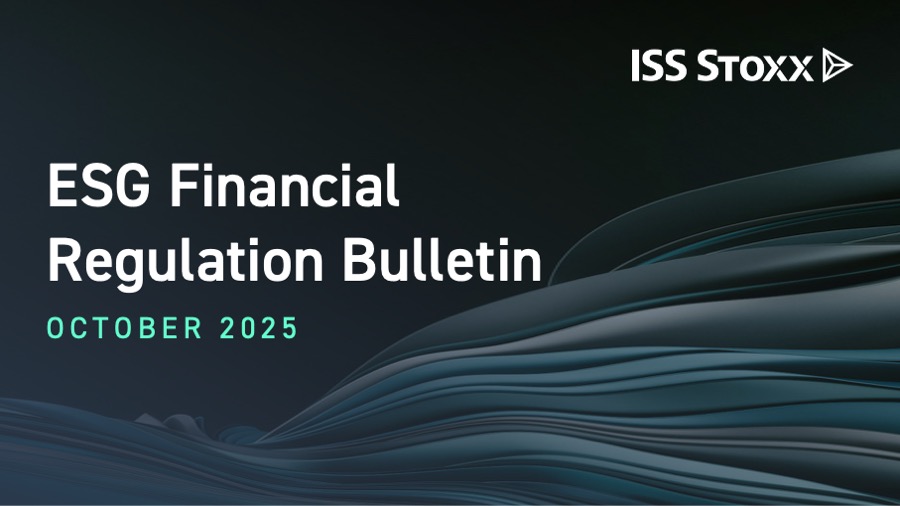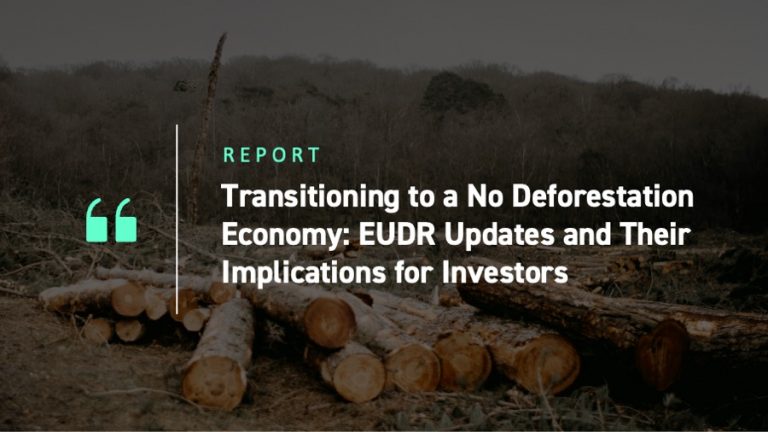


TNFD
Taskforce on Nature-related Financial Disclosures Publishes Guidance on Level of Alignment with Indian Nature-Related Reporting Requirements
The India Business and Biodiversity Initiative (IBBI), the Confederation of Indian Industry (CII), and the Taskforce on Nature-related Financial Disclosures (TNFD) published guidance outlining the alignment between India’s Business Responsibility and Sustainability Reporting (BRSR) regime and TNFD frameworks on September 2. According to the announcement, the guidance, entitled Integrating Nature-Related Aspects in Business Responsibility & Sustainability Reporting (BRSR) Disclosures Using the TNFD Recommendations, demonstrates a high level of consistency between the disclosures and metrics recommended by the TNFD and those required of India’s top 1,000 companies under the BRSR requirements. Specifically, most of the TNFD’s 14 recommended disclosures on governance, strategy, and risk management are reflected in the BRSR requirements.
TNFD Provides Technical Input on Proposed EFRAG Revisions to the European Sustainability Reporting Standards
In response to the EFRAG public consultation on the revised and simplified Exposure Drafts of the European Sustainability Reporting Standards (ESRS), the TNFD Secretariat sent a technical note to the Chair of the EFRAG Sustainability Reporting Technical Expert Group on September 19. In its technical feedback, the TNFD welcomes the consolidation of the ESRS and encourages EFRAG to establish a more coherent disclosure regime with regard to nature-related issues. The TNFD also highlights the importance of maintaining consistency between emerging international reporting standards and the ESRS, partly by relying upon the conceptual foundations established by the TNFD recommendations.
Global Reporting Initiative Highlights the Importance of Enhancing Impact Materiality in the ESRS
The Global Reporting Initiative (GRI) published its response to the EFRAG consultation on the revised and simplified ESRS on September 25. The GRI response highlights the need to avoid misalignment between EU standards and emerging global reporting frameworks and calls upon EFRAG to enhance impact materiality within the revised ESRS. In particular, GRI suggests that EFRAG align the definition of impact materiality with the GRI Standards, pursue greater interoperability with global standards, address the reduced ESRS coverage by using the GRI standards to fill reporting gaps, and reconsider the application of a net-based approach to impact assessment.
GRI Opens Public Consultation on GRI Monetary Flows Standard
The GRI opened a public consultation on its proposed Monetary Flows Standard, which involves revisions to the GRI 201: Economic Performance, on September 29. The new and revised GRI standards seek to reflect how an organization’s financial activities cascade to create value for stakeholders and society, contributing to growth and shared prosperity. The proposed Monetary Flows Standard aims to strengthen the link between financial reporting and sustainability reporting by applying a sustainability lens to the data that organizations already collect as part of their financial disclosure requirements. The consultation remains open until December 17.
The Science Based Targets Initiative Publishes the First Draft of Its Power Sector Net Zero Standard for Feedback
The Science Based Targets initiative (SBTi) opened a public consultation on the first draft of its Power Sector Net-Zero Standard on September 2. According to the SBTi, the power sector is responsible for approximately 40% of global energy-related emissions and is increasingly exposed to climate risks, including threats to critical infrastructure and generation capacity. Consequently, the SBTi has developed the draft Power Standard to facilitate the sector’s decarbonization through near- and long-term carbon reduction targets aimed at achieving Net Zero in the sector by 2050. The public consultation remains open until November 3.


Hong Kong
Hong Kong Monetary Authority Opens Public Consultation on Phase 2A Prototype of the Hong Kong Taxonomy for Sustainable Finance
The Hong Kong Monetary Authority (HKMA) launched a public consultation on the Phase 2A prototype of the Hong Kong Taxonomy for Sustainable Finance on September 8. Hong Kong’s Taxonomy framework aims to enable sustainable investment by providing clear definitions and performance criteria for green and sustainable activities. The Hong Kong Taxonomy is being developed according to a phased approach, with Phase 1 having been published in May 2024. The Phase 2A prototype introduces several enhancements aimed at supporting Hong Kong’s decarbonization efforts and facilitating the transition to a low-carbon economy. Key enhancements include expanded sector coverage, an increase in the number of economic activities with technical screening criteria from 12 to 25, transition elements, and a new environmental objective. The public consultation remains open until October 8.
Securities and Futures Commission and the Asian Development Bank Institute Co-Host Roundtable on Developing Capital Markets through Various Sustainable-related Thematic Instruments
In the context of the Hong Kong Green Week, the Hong Kong Securities and Futures Commission (SFC) and the Asian Development Bank Institute (ADBI) co-hosted a roundtable on September 9 to discuss the uptake and development of sustainable finance in Asia-Pacific capital markets. The roundtable was the fifth of its kind and part of the Asia Climate Finance Dialogue Project of the ADBI. Over 12 jurisdictions were represented at the roundtable and shared insights on the latest trends and innovations with respect to sustainable finance in their local markets, including green bonds; blue bonds; and environmental, social, and governance (ESG) funds.
Hong Kong Government Agencies Reaffirm Their Commitment to Developing a Comprehensive Sustainability Disclosure Regime in Hong Kong
Mr. Christopher Hui, the Hong Kong Secretary for Financial Services and the Treasury (SFST), and Dr. Kelvin Wong, Chairman of the Hong Kong Securities and Futures Commission (SFC), delivered remarks at the Hong Kong Forum on Sustainability Disclosures on September 10. The Forum, co-organized by Hong Kong’s Financial Services and Treasury Bureau and the SFC, reaffirmed the Hong Kong government’s commitment to introducing a comprehensive sustainability disclosure regime in Hong Kong based on and fully aligned with the ISSB Standards.
In his keynote speech, Mr. Hui described the steps taken to introduce sustainability disclosures in Hong Kong in collaboration with the Hong Kong Exchanges and Clearing Limited (HKEX). Mr. Hui highlighted that complementary initiatives were underway to ensure Hong Kong had adequate sustainability reporting and assurance competencies and data technology infrastructure to support the higher level of disclosure expected of companies. Mr. Hui also underlined that Hong Kong remained committed to sustainability disclosures “amid the current complicated geopolitical environment.” In his remarks, Dr. Wong described a higher level of sustainability disclosure as a “win-win for corporates and investors,” enabling both to “grasp the increasingly complex risks to their business.”
Hong Kong Exchanges and Clearing Limited Signs Memorandum of Understanding with Several Chinese Exchanges to Advance Carbon Market Ecosystem in Greater Bay Area
Hong Kong Exchanges and Clearing Limited (HKEX) signed a Memorandum of Understanding on September 23 with the Guangzhou Emissions Exchange (CEEX), the Shenzhen Green Exchange (SGE), and the Macau International Carbon Emission Exchange (MEX) to deepen cooperation with respect to carbon markets and the green finance ecosystem across the Greater Hong Kong Bay Area. Under the MoU, the four exchanges will work closely to explore new opportunities in the carbon market, engaging in more regular dialogue and sharing relevant expertise. The agreement aims to unlock new opportunities in green finance regionally and, in the words of HKEX Group Chief Sustainability Officer Paul Chow, “enhance the connection between the mandatory and voluntary carbon markets in the Chinese Mainland and internationally.”
Malaysia
The Securities Commission Malaysia Issues Guidelines on Social Exchange Platforms
The Securities Commission (SC) Malaysia published Guidelines to establish Malaysia’s first Social Exchange on September 19. According to the SC, the social exchange will provide a transparent venue for non-profit organizations to raise funds for eligible social impact projects, consistent with Malaysia’s sustainability and inclusion agenda. Applications to operate the social exchange also opened on September 19.
Thailand
Securities and Exchange Commission Thailand Seeks Public Comments on Proposed Regulatory Amendments Enhancing Sustainability-Related Disclosures for Thai Listed Companies
The Securities and Exchange Commission (SEC) Thailand opened a public consultation on September 22 (referred to as a “public hearing”) regarding the introduction of sustainability disclosure requirements for Thai Listed Companies. The proposed sustainability disclosure requirements are aligned with the ISSB Standards and the SEC’s draft amendments to the relevant existing regulations have been subject to scrutiny and approved by Thailand’s Capital Market Supervisory Board. The SEC Thailand has thus proceeded with its public consultation to seek feedback on the scope, application timeframe, disclosure of greenhouse gas emissions, limited assurance, and transition reliefs associated with the future sustainability disclosure regime. The consultation remains open until October 22.
New Zealand
The Financial Market Authority of New Zealand Opens Public Consultation on Proposed Guidance for Ethical Investing Disclosure
New Zealand’s Financial Market Authority (FMA) opened a public consultation on September 24 on transparency requirements for financial products incorporating ethical characteristics. The consultation seeks feedback on draft guidance for issuers of said financial products and explains how the disclosure obligations stemming from New Zealand’s “fair dealing” provisions under the Financial Markets Conduct Act 2013 apply when describing ethical characteristics. Once finalized, the guidance will supersede previous FMA guidance under the 2020 Disclosure Framework for Integrated Financial Products. The consultation remains open until November 7.


EU
The European Supervisory Authorities Release Fourth Report on Voluntary Disclosure of Principal Adverse Impacts under Sustainable Finance Disclosure Regulation and Date of SFDR Review Confirmed
The Joint Committee of the European Supervisory Authorities (ESAs), consisting of the European Banking Authority (EBA), the European Securities and Markets Authority (ESMA), and the European Insurance and Occupational Pensions Authority (EIOPA) published their fourth annual report on the extent of voluntary disclosure of principle adverse impacts (PAIs) under the Sustainable Finance Disclosure Regulation (SFDR) on September 9. The report finds that Financial Market Participants (FMPs) have been steadily improving the quality of their PAI voluntary disclosures at both the entity and product level. As in previous years, the report highlights that larger multinational groups tend to provide more detailed disclosures, while smaller entities often combine general ESG or marketing information with their SFDR disclosures.
Moreover, the European Commission has indicated that the legislative proposal initiating the review of the SFDR is expected to be introduced on November 19.
The Court of Justice of the European Union Dismisses Austria’s Legal Action Against the Inclusion of Nuclear Energy and Fossil Gas in the EU Taxonomy
The General Court of the Court of Justice of the EU issued a judgement on September 10 dismissing Austria’s legal action against the inclusion of nuclear energy and fossil gas in the EU Taxonomy. The General Court found that the European Commission is entitled to take the view that certain economic activities in the nuclear energy and fossil gas sectors can, under certain conditions, contribute substantially to climate change adaptation and mitigation.
The Spanish Government Mandates Companies to Report and Reduce Carbon Emissions
The Spanish Government introduced a Decree transposing the EU’s Corporate Sustainability Reporting Directive (CSRD) into national law on April 12. Under the provisions of the Decree, applicable as of June 2025, approximately 4,000 companies in Spain will be required to report on their emissions and carbon reduction plans or risk being excluded from public procurement processes.
UK
The Financial Conduct Authority Consults on Amendments to the U.K. Sustainability Disclosure Regime
The Financial Conduct Authority (FCA) included proposed amendments to the U.K. Sustainability Disclosure Regime (SDR) in its Quarterly Consultation on updates to the FCA Handbook. Through the amendments, the FCA is seeking to give firms more flexibility in relation to their public product-level sustainability reports. For example, the amendments clarify that the qualifying criteria for labels were designed to accommodate both active and passive strategies, including where a product tracks an index. The Quarterly Consultation remains open until October 15.


The California Air Resources Board Releases Draft Guidance on SB 261, the Climate-Related Financial Risk Act, to Facilitate Entities in Complying with their Climate-Related Disclosure Obligations
The California Air Resources Board (CARB) published draft guidance on SB 261 (California’s Climate-Related Financial Risk Act) on September 2. The draft guidance, which does not have the force of law and is not intended to establish new mandatory requirements, outlines minimum disclosure requirements consistent with the recommendations of the Task Force on Climate-related Financial Disclosures (TCFD). The guidance also indicates that reporting entities should focus on disclosing climate-related financial risks and measures adopted to reduce and adapt to climate-related financial risks that are material to their operations and financial outlook. The guidance also stipulates that reporting entities should state which disclosure framework they apply and explicitly state the disclosures they have made and those they have not.
Relatedly, CARB released on September 26 a Preliminary List of the entities subject to SB 253 (Corporate Greenhouse Gas Disclosure Program) and SB 261.
The Securities and Exchange Commission Chair Paul Atkins Expresses Concerns over Global and EU Sustainability Reporting and Due Diligence Requirements
The U.S. Securities and Exchange Commission (SEC) Chair Paul Atkins raised concerns over global and European sustainability reporting and due diligence requirements during his keynote address at the inaugural OECD Roundtable on Global Financial Markets in Paris on September 10. Chair Atkins remarked that the IFRS Foundation, which oversees the International Accounting Standards Board (IASB) and the ISSB, “cannot divert its focus from its long-standing core responsibility of funding the IASB” and that the IASB should promote “high-quality accounting standards that are focused solely on driving reliable financial reporting and are not used as a backdoor to achieve political or social agendas.”
Chair Atkins also commented on the EU’s Corporate Sustainability Reporting Directive (CSRD) and Corporate Sustainability Due Diligence Directive (CSDDD) and their extraterritorial application, expressing his concern with “the prescriptive nature of these laws and their burdens on U.S. companies.”
The SEC Intends to Propose New Rules Impacting Sustainability Disclosures
At the Georgetown Financial Markets Quality Conference on September 25, the U.S. SEC Chair Paul Atkins stated that the SEC intends to make rules impacting how companies report on climate and other sustainability-related matters in SEC regulatory filings, as well as on other topics. Chair Atkins explained that companies dedicate multiple pages in their annual 10-K reports to meet SEC requirements to discussing risk factors, potentially confusing investors as to what is important. Chair Atkins said he expects the SEC to consider updating disclosure rules, noting that the SEC may also consider changes to rules for companies’ executive compensation reporting. For more information, see also the SEC’s “Reg Flex Agenda.”



By:
Hugo Gallagher, Senior Associate, Regulatory Affairs & Public Policy, ISS STOXX
Karina Karakulova, Director of Regulatory Affairs & Public Policy, ISS STOXX




